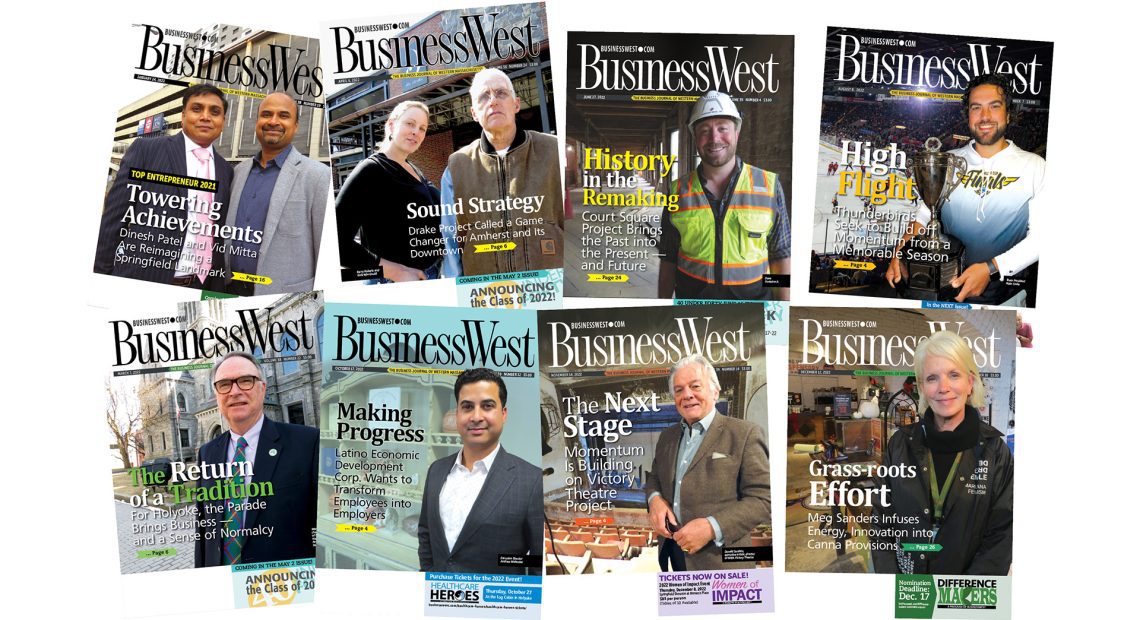
Year in Review
Here Are the Stories That Impacted Western Mass. in 2022
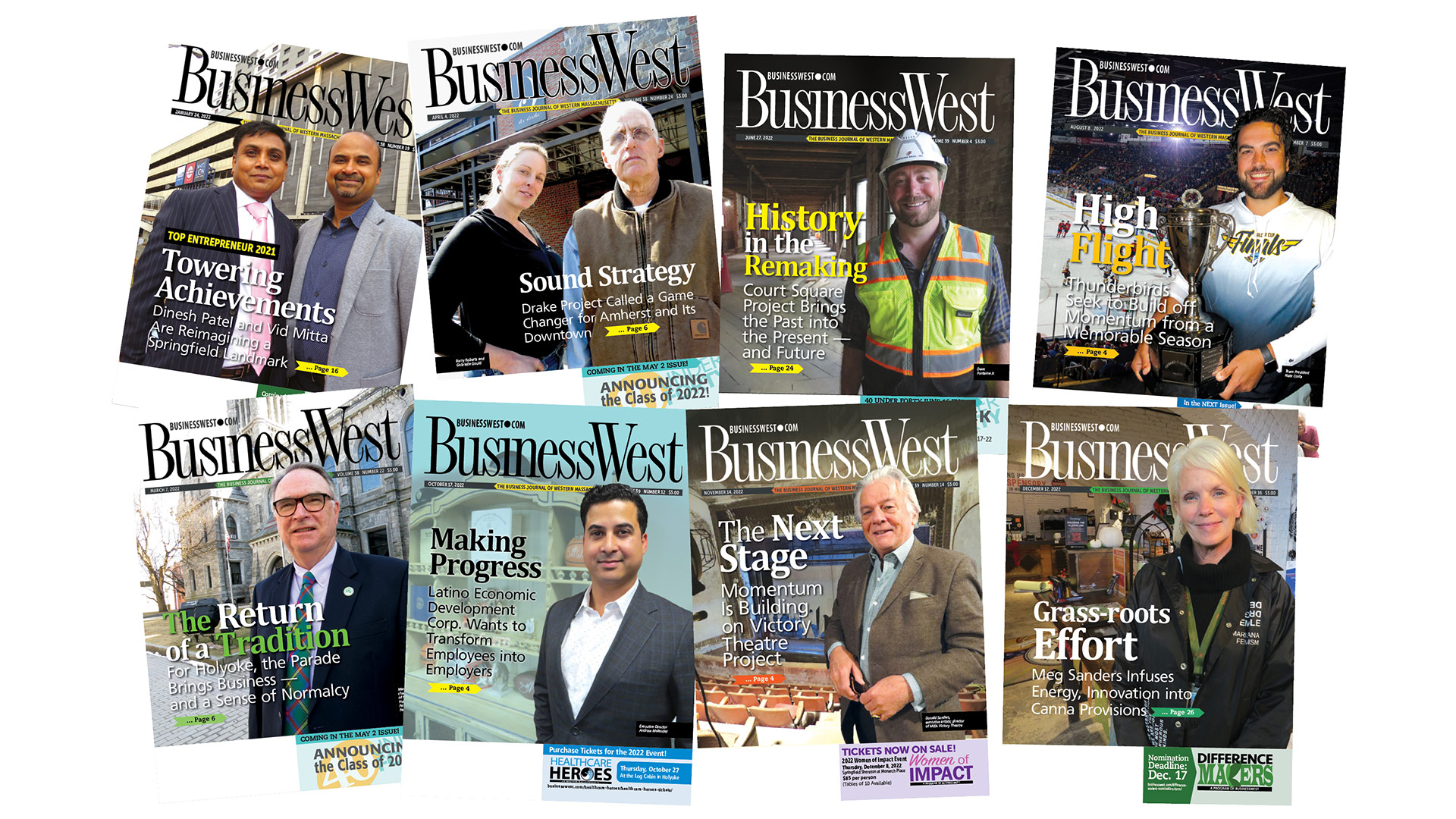
By George O’Brien and Joseph Bednar
Cannabis Sector Continues to Grow
How many dispensaries is too many? Cities like Northampton, Holyoke, and Easthampton that have embraced the cannabis industry are demonstrating that many such businesses can thrive together, while generating healthy tax revenues for the municipality itself. However, the recent closure of the Source — the state’s first adult-use dispensary to close since shops began opening in 2018 — poses new questions on the competition front.
There’s no doubt cannabis has been a success in Massachusetts, with recreational sales approaching $4 billion since legalization. But one big question is what form the industry will eventually take — with some predicting eventual consolidation by bigger entities alongside a robust population of boutique sellers — and how the state will continue to protect opportunities for smaller players, especially minorities.
The latter prospect was strengthened by a law passed in August aimed at giving minority cannabis entrepreneurs easier access into the industry, and also paving the way for municipalities to allow marijuana cafés. The bill also better regulates host community agreements, creates a state-run loan fund for minority entrepreneurs, lowers taxes for marijuana businesses, and makes it easier to expunge records for old marijuana offenses.
In short, this story is still evolving in intriguing ways.
Companies Grapple with Workforce Challenges
The pandemic temporarily dislodged millions of people from their jobs, and when companies started rehiring again, they found it was much more difficult to recruit and retain employees, particularly in lower-paying industries like hospitality, but it was a trend that stretched across all fields, from healthcare to construction to … well, you name it.
At issue has been three intersecting trends: the Great Resignation of older workers, many of whom moved up their retirement timeline in the wake of the pandemic’s economic upheaval; a movement among Gen-Zers and younger Millennials, particularly in service industries, to re-evaluate their worth and push for higher wages and more flexibility; and ‘quiet quitting,’ defined as doing the bare minimum to fulfill one’s job, which, of course, cuts into a company’s productivity.
There are no easy answers to combat these trends, and companies struggling with workforce shortages must grapple with what they mean in the longer term. Workers no doubt have leverage right now like they haven’t had in recent memory, and they’re wielding it, to significant — and, in many cases, still-undetermined — effect.
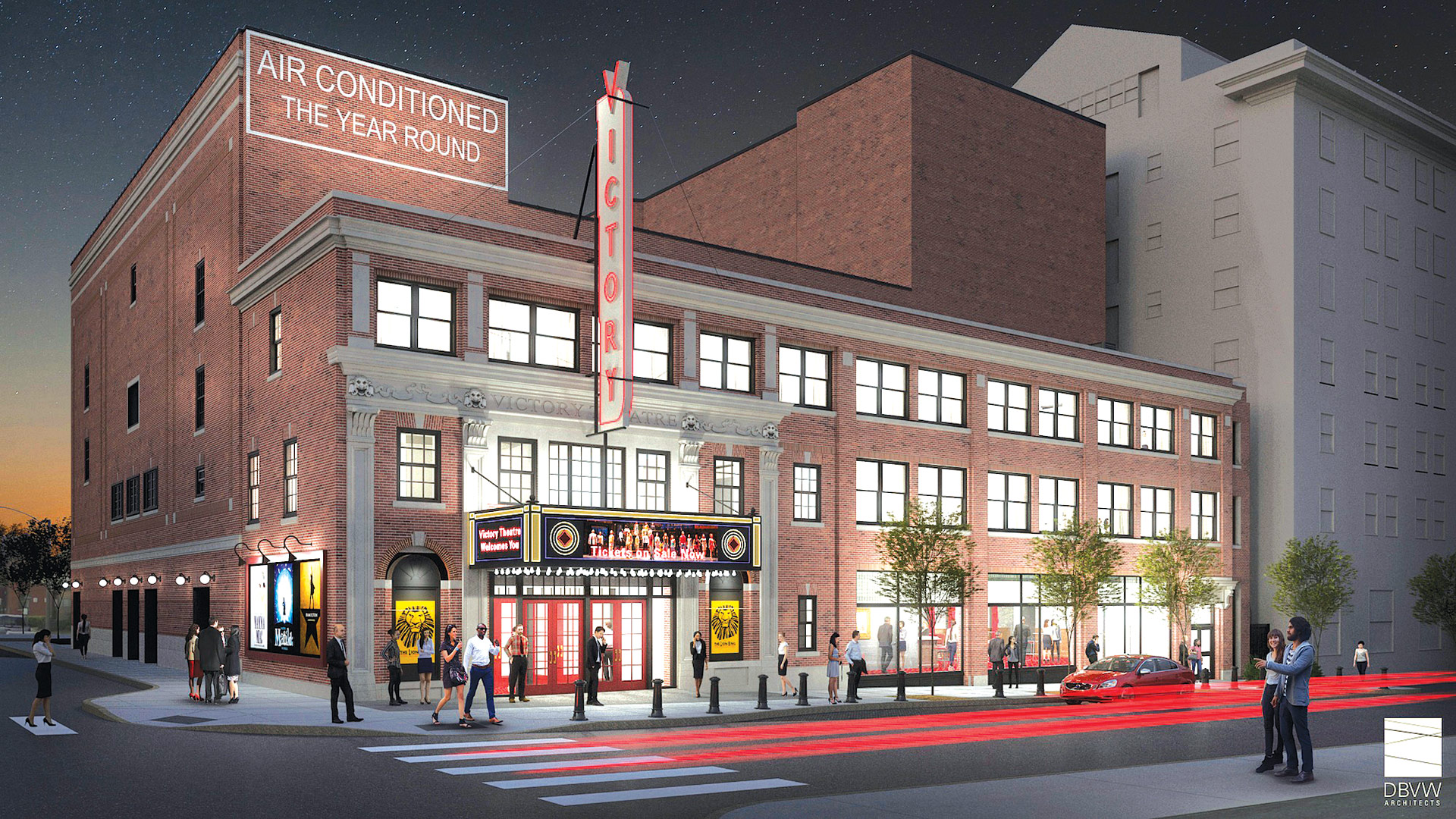
An architect’s rendering of a renovated Victory Theatre
Victory Theatre Project Gains Momentum
Holyoke officials and groups involved with the arts have been engaged in efforts to try to revitalize the historic Victory Theatre for more than 40 years now. And while this initiative still has a ways to go before it can cross the goal line, some significant progress was seen this past year.
It came in several forms, but especially the earmarking of ARPA funding to renovate the theater, which opened in the 1920s and last showed a movie in 1979. The ARPA funding is expected to help close the gap between the funds that have been raised for the initiative and the total needed — roughly $60 million.
Momentum can also be seen in a firm commitment on the part of Joshua Garcia, the city’s first Hispanic mayor, who sees the project as an important catalyst for bringing new businesses to downtown Holyoke and another key ingredient in the larger formula for revitalizing the Paper City.
The Marriott Flag Returns to Downtown Springfield
It took more than three years, and there were a number of challenges to overcome along the way, but the Marriott flag is now flying again over the hotel in the Tower Square complex. The massive renovation — or “re-imagining” — of the space, as it’s been called, earned Tower Square owners Dinesh Patel and Vid Mitta BusinessWest’s Top Entrepreneur honor for 2022.
But the undertaking has done more than that. It has helped transform the property into one of the best hotels west of Boston, and it has become a stunning addition to a Tower Square complex that has been reinvented as well, with intriguing additions ranging from the Boys & Girls Club of Greater Springfield to White Lion Brewery to a scaled-down version of a Big Y supermarket soon to emerge in space formerly occupied by CVS.
The new Marriott staged a truly grand opening in November, an event that was a big day not just for Patel and Mitta, but for the entire city.
Remote Work Is Here to Stay
This past year was one in which the region’s business community was to return to normal in most all respects after two painful years of COVID. But there was one realm where it didn’t — and that was by choice.
Indeed, remote work continued to be part of the landscape in 2022, but this time there was an air of permanence to the concept, not merely a temporary response to COVID. In interviews for stories written over the course of the year, owners of businesses large and small said remote work and hybrid work schedules have become the new norm. They have become a benefit of sorts for valued workers and have become an effective means for attracting and recruiting talent, as well as for as widening the net for job applicants well beyond the 413 area.
The full impact of remote work on the commercial real-estate market and small businesses that rely on workers being in their offices — restaurants and bars, for example — has yet to be fully and accurately measured, but it appears that this fundamental change in how people work is here to stay.
East-west Rail Chugs Forward
East-west rail service between Pittsfield and Boston is still far from reality, and plenty can still happen to derail the decades-long dream of so many legislators, businesses, municipalities, and other rail advocates. But 2022 marked the strongest progress toward that goal yet, with $275 million allocated toward the project in August as part of the state’s $11 billion infrastructure bill — a good start, but only a start.
A high-speed rail connection between the Hub and Western Mass. is about more than convenience; it’s about expanded opportunity — both for workers who can earn Boston wages while enjoying a decidedly non-Boston cost of living, and also for employers who can cast a wider net for talent — not to mention easier access to recreational and regional resources, as well as reduced traffic and emissions.
“We have the money, the support, and I have secured the commitment from both the outgoing Baker-Polito administration and the incoming Healey-Driscoll administration to keep this train literally and metaphorically moving forward,” U.S. Rep. Richard Neal said earlier this month. “This is an opportunity that will not avail itself again, and now is the time to move on an east-west rail project that will be transformative for all of Massachusetts.”
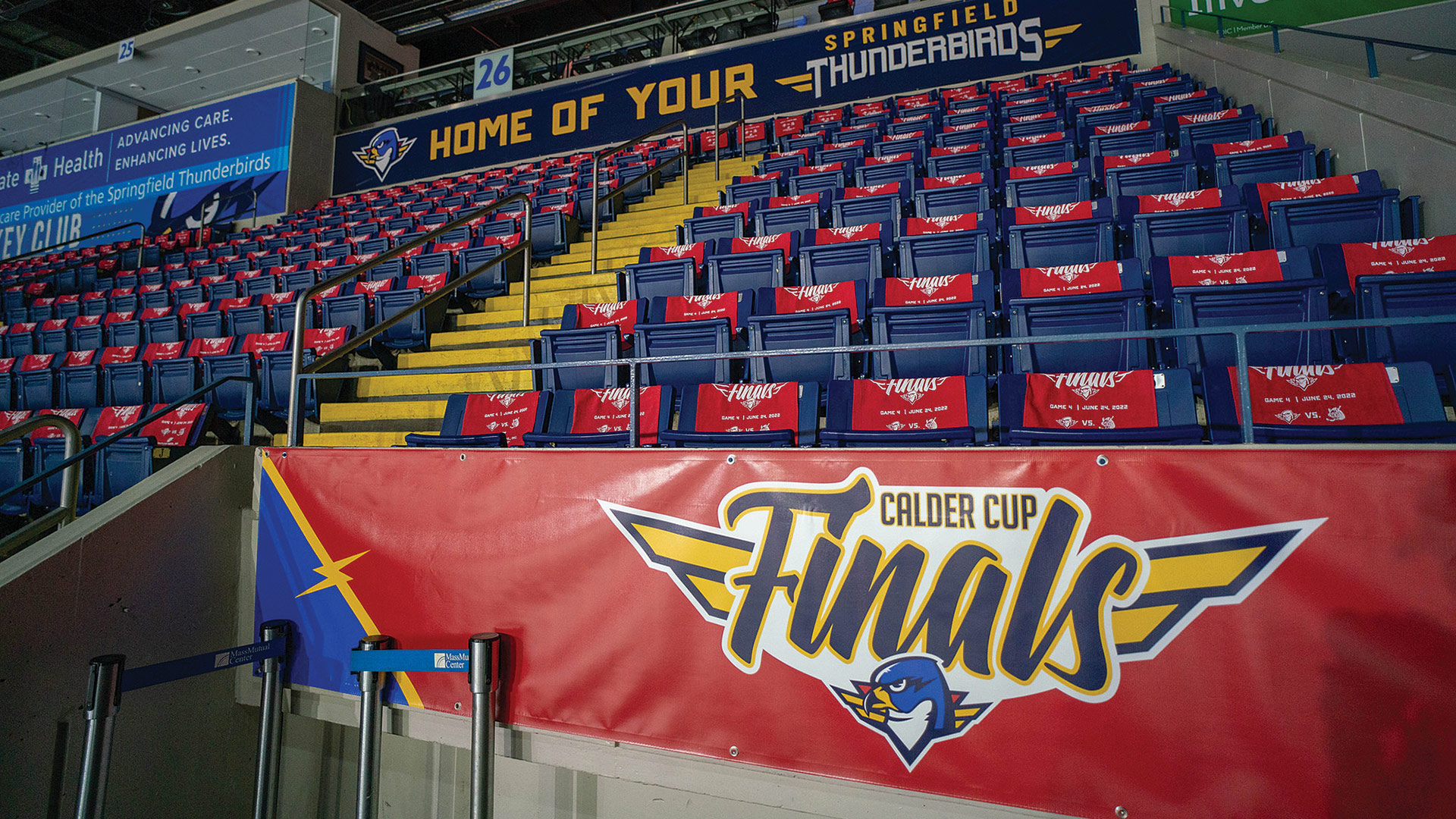
The T-Birds came up a few wins shy of an AHL championship, but their playoff run was a huge win for the team and the region.
Springfield Thunderbirds Reach AHL Finals
The Springfield Thunderbirds eventually wound up a few wins shy of a Calder Cup this past spring. But their dramatic run to the finals was a huge win for the team, the city, and the region.
Indeed, the race for the cup captured the attention of the entire area, with fans old and new turning out at the MassMutual Center, tuning in on social media, and talking about the team at the water cooler — or the weekly Zoom meeting.
The team, which eventually lost in the finals to the Chicago Wolves, created a great deal of momentum with its playoff run, as well as a surge in season-ticket sales. While not all deep playoff runs are financial success stories, this was one, said the team’s president, Nate Costa. It was also validation for him and for the ownership group that stepped up and brought hockey back to Springfield when the Falcons departed for Arizona.
There’s now an Eastern Conference Championship banner hanging in the MassMutual Center, and even more of a connection between the region and its pro hockey team.
Holyoke St. Patrick’s Day Parade Returns
After a long, as in very long, two-year absence, the Holyoke St. Patrick’s Day Parade and road race returned in full force in March. The twin events have always been part of the fabric of the region and a huge contributor to the Greater Holyoke economy, and that became clear in interviews with parade organizers, city officials, and individual business owners in the weeks leading up to the parade for a story in BusinessWest that carried the headline: “The Return of a Tradition: For Holyoke, the Parade Brings Business — and a Sense of Normalcy.”
Business owners told BusinessWest that the parade and race account for large amounts of annual revenues, and that losing the events for two years due to COVID was devastating. But beyond business and vibrancy, something else went missing for those two years. Marc Joyce, president of the parade for the past three years, put it all in perspective.
“It’s in the mindset and emotions of people who have grown up here,” he said. “It’s a homecoming; people come back to the city, and you see people you haven’t seen since perhaps last year. It’s a wonderful, family-oriented event.”
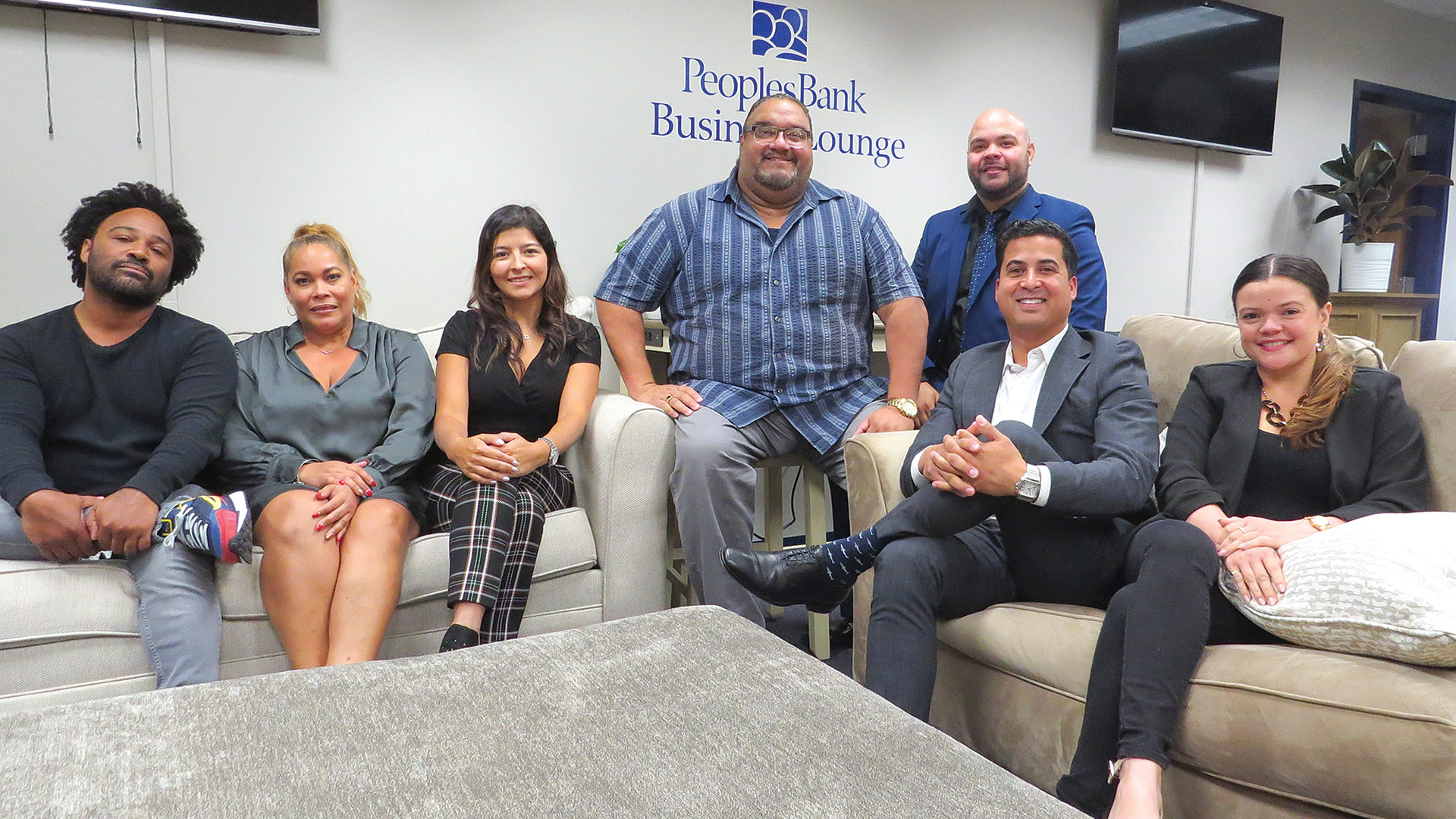
The LEDC has a unique model featuring coaches on matters ranging from accounting to mental health.
Latino EDC Opens Its Doors
The Latino Economic Development Corp. opened its doors to considerable fanfare in September, and with good reason. The agency, called the Latino EDC, or LEDC, has a broad mission and a unique business model, one aimed at helping businesses, especially Latino-owned businesses, open their doors and keep them open.
The LEDC, located on Fort Street in Springfield, is a place where more than two dozen coaches, experts in many aspects of business, will make themselves available to business owners and share what they know. Executive Director Andrew Meledez says the agency will focus on what he calls the three ‘Cs’ of helping business owners get where they want to go — coaching, capital, and connections. Overall, its goal is to turn employees into employers, and the agency is already capturing the attention of economic-development leaders in this region — and well beyond.
New College Presidents Take the Reins
College and university presidents are in many ways key regional voices, shaping public perspectives on issues through programs and initiatives they spearhead. And in 2022, that exclusive pool of influencers saw some significant ripples.
In April, Hubert Benitez, vice president for Strategic Initiatives and Academic Innovation and acting chief Inclusion officer at Rockhurst University, took the reins at American International College, replacing Vince Maniaci, who had been president there for 17 years.
Then Michelle Schutt, previously vice president of Community and Learner Services at the College of Southern Idaho, began her tenure as president of Greenfield Community College in July, replacing Richard Hopper, who had been interim president since the summer of 2021.
Also in July, Smith College announced that Sarah Willie-LeBreton, provost and dean of faculty at Swarthmore College, will replace Kathleen McCartney, who has served as president since 2013, starting in July 2023.
Finally, in June, UMass Amherst Chancellor Kumble Subbaswamy announced he will retire in June 2023 after serving in that role since 2012, and the following month, Christina Royal, president of Holyoke Community College since 2017, announced she will retire in July 2023; searches are on to replace both.
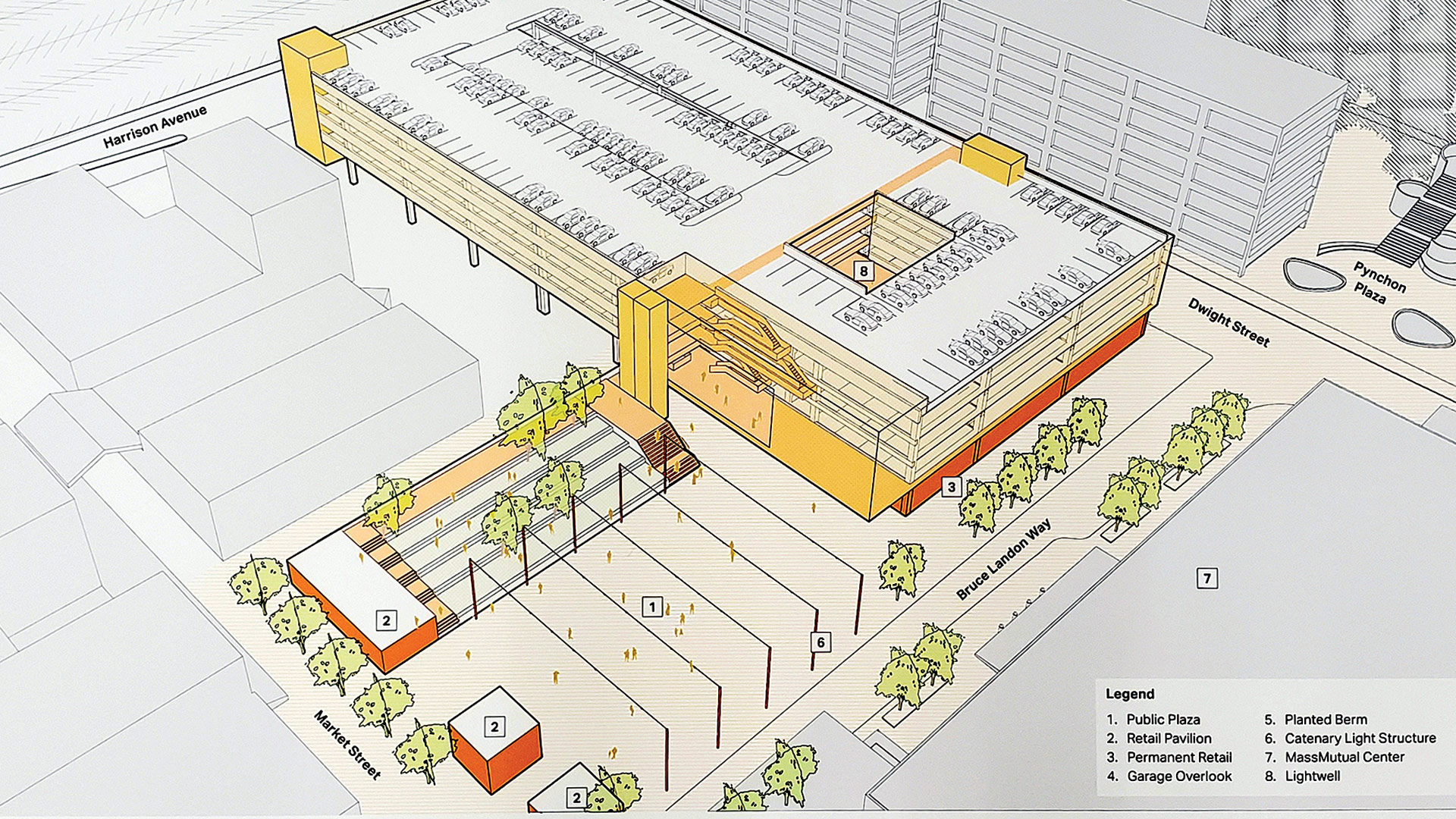
An architect’s rendering of the new parking-garage facility at the MassMutual Center.
Civic Center Parking Garage Comes Down — Finally
After years of talking about and working with state leaders to assemble the financing to build a replacement, the city tore down the crumbling Civic Center Parking Garage this fall. As the demolition crews began their work, workers in downtown office buildings paused to watch.
It wasn’t a landmark that was coming down, but rather a decaying structure that had become a symbol of all that Springfield was trying to put behind it — the hard economic times, aging infrastructure, and a downtown of another era.
While the long-awaited demise of the parking garage was news, the more exciting news is what’s going up in its place — a new, state-of-the-art, environmentally friendly, 1,000-space facility, and activation of abutting property, acquired by the city, that will enable Springfield to create an atmosphere that officials say will be similar to the scene at Fenway Park on game nights.
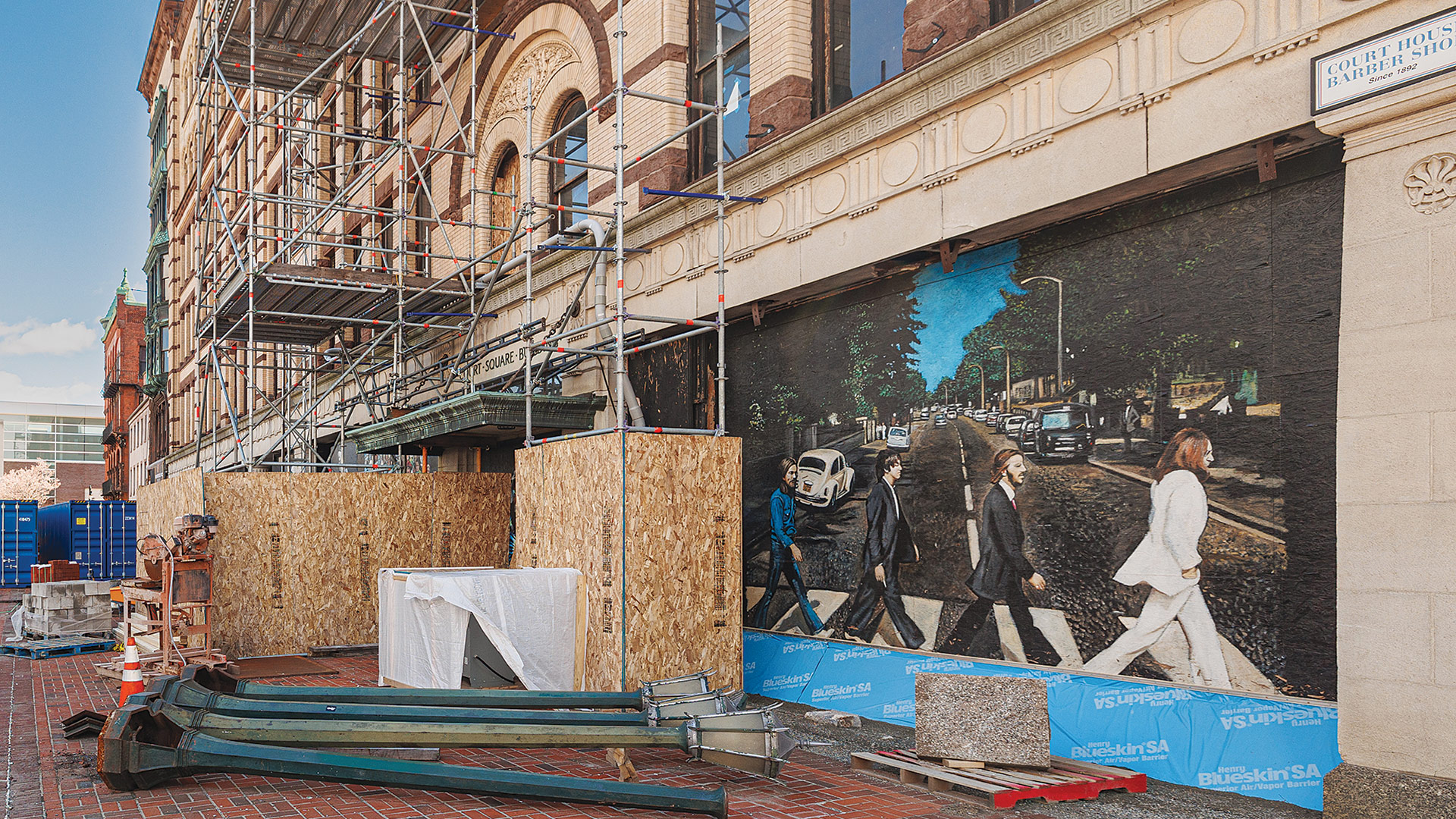
The transformation of the old Court Square Hotel is a long time coming.
Court Square Transformation Project Proceeds
When Dave Fontaine Jr. talks about work to renovate the former Court Square Hotel into market-rate apartments being a “generational project,’” he means it. Indeed, when he talked with BusinessWest about the initiative this past summer, he said he believes his father and grandfather were both involved in bids on projects to transform the property going back more than 30 years.
It’s taken decades of effort, but the transformation of the property is now well under way. The project is expected to not only bring new life to that historic property — in the form of 71 units of housing as well as retail on the ground floor — but also create more vibrancy in the city’s downtown and possibly be a catalyst for new hospitality and service-sector businesses.
The Court Square project is a true public-partnership, with funding support from several parties, including Winn Development, Opal Development, the state, the city, and MGM Springfield. And it will make sure that an important part of the city’s past is now a vital cog in its future.
Navigating Challenges in Auto Sales
This past year was another wild ride, if that’s the right term, for the region’s auto dealers. Indeed, the trends that emerged in 2020 and 2021 — from historically low levels of inventory to sky-high prices and low inventory of used cars — continued in 2022.
Matters improved to some degree for area dealers, but there were still many challenges to face — and still a number of used cars taking up space on the showroom floors.
But perhaps the biggest news in 2002 involved electric vehicles, with many dealers reporting huge increases in the sales of such models. There are several reasons why, but simple math is perhaps the biggest, with drivers of electric vehicles — after the initial investment, anyway — spending far less to get from here to there than those with gas-powered cars, trucks, and SUVs.
That trend is expected to continue into next year, say area dealers, as more makers introduce electric-vehicle lines.
Live Music Scene Expands
When the Drake opened in downtown Amherst in April, it became the town’s first-ever dedicated music venue, hosting everything from jazz and rock to funk and world music. And it opened at a time when demand for live music in the region is on the rise, and an increasing number of spaces are meeting the need.
With Eric Suher’s Iron Horse Music Hall, Pearl Street Nightclub, and Mountain Park shuttered to concerts these days and the Calvin Theatre hosting a bare trickle of tribute bands, others have picked up the slack.
They include not just the Drake, but Race Street Live, which hosts national touring acts in the Gateway City Arts complex in Holyoke; Hawks & Reed Performing Arts Center in downtown Greenfield, which schedules a robust slate of events across four spaces; MASS MoCA, which hosts concerts inside the museum and festivals outside it; Bombyx Center for Arts & Equity in Florence, which opened in October 2021 in a converted 1861 church; and many more.
It’s clear that people are enjoying live music again, and a new generation of venues — and some venerable ones as well — are stepping up to meet that need.
Moving On from COVID
President Biden declared COVID over in September. With a winter setting in in which doctors are warning of a ‘tripledemic’ of flu, RSV, and COVID, that’s … well, not quite the truth, not with about 350 people still dying from COVID each day in the U.S., about 85% of them unvaccinated.
What is true is that, even as some people are still overcoming COVID, just about everyone is over it — and especially over the disruptions the pandemic caused to the global economy.
Still, moving on is easier said than done, as is shifting back to something resembling business as usual pre-2020. Construction firms still face challenges with scheduling and cost, knowing that the supply chain can be wildly inconsistent. Families still struggle with inflation, and are getting hit hard by the tonic being poured on it: higher interest rates for loans. As noted earlier, real-estate owners wonder whether a slowed market will remain so as tenants decide they need less space for a workforce that has gone largely remote and may remain so.
In short, moving on from COVID is a slow process, and its effects will continue to reverberate, no matter how much anyone — even the president — wishes it would just go away.
George O’Brien can be reached at [email protected]
Joseph Bednar can be reached at [email protected]




